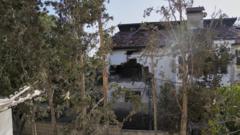Amid fears of retribution, Palestinians in Gaza are increasingly vocal in their opposition to Hamas, reflecting a significant shift as protests against the group's governance emerge, calling for change amid escalating turmoil.
Resurgence of Defiance: Palestinians Protests Against Hamas Signal Shift in Gaza

Resurgence of Defiance: Palestinians Protests Against Hamas Signal Shift in Gaza
Rising dissent in Gaza illustrates the growing public frustration with Hamas as protests against the group intensify amid ongoing conflict.
As tensions in Gaza escalate, a wave of public defiance against Hamas is becoming increasingly evident, marking a notable shift in sentiment among Palestinians. Videos circulating on social media showcase crowds chanting “Out! Out! Out!” and denouncing the group that has held power for nearly two decades. The worsening humanitarian crisis in the territory has fueled this growing unrest, with many blaming Hamas for the dire conditions faced by the population.
Public figures like Moumen al-Natour, a lawyer and former activist, are emerging as vocal critics of Hamas. “We didn’t choose Hamas,” al-Natour asserted, emphasizing the group's tightening grip on the Palestinian populace. He described the frustrations and existential sense of waste that many share, trapped in cycles of violence. Though dissent poses significant risks, with critics facing dire consequences, al-Natour insists on the necessity of standing firm against the oppression.
Reports highlight violent crackdowns on protesters, with tragic instances such as the recent torture and murder of Oday al-Rubai—an act condemned by human rights organizations as an extrajudicial killing. The atmosphere of fear permeates daily life in Gaza, forcing citizens like al-Rubai to express their fears on social media, describing Gaza as a “city of ghosts.”
Despite these dangers, individuals are increasingly willing to confront Hamas’s authority. Eyewitness accounts from Beit Lahiya illustrate a recent incident where locals banded together to prevent militants from using a home for military operations, showcasing a united stand against armed intimidation. Protesters are not simply voicing opposition to Hamas; they are demanding an end to military actions that bring about further suffering.
Parallel to these internal protests, residents are voicing criticism of both Hamas and wartime adversary Israel, leaving some feeling caught between two evils, as voiced by Amin Abed, a long-time opponent of Hamas now living abroad due to persecution.
The protests in Gaza may not yet signify a full-scale rebellion, but they represent a crucial moment of transformation, as the grip of Hamas begins to weaken amidst rising dissent and increasing public demands for justice and accountability. The path ahead remains fraught with danger and complexity, yet the renewed assertiveness of Gaza's residents suggests a potential shift in the decades-long narrative of control and oppression.


















